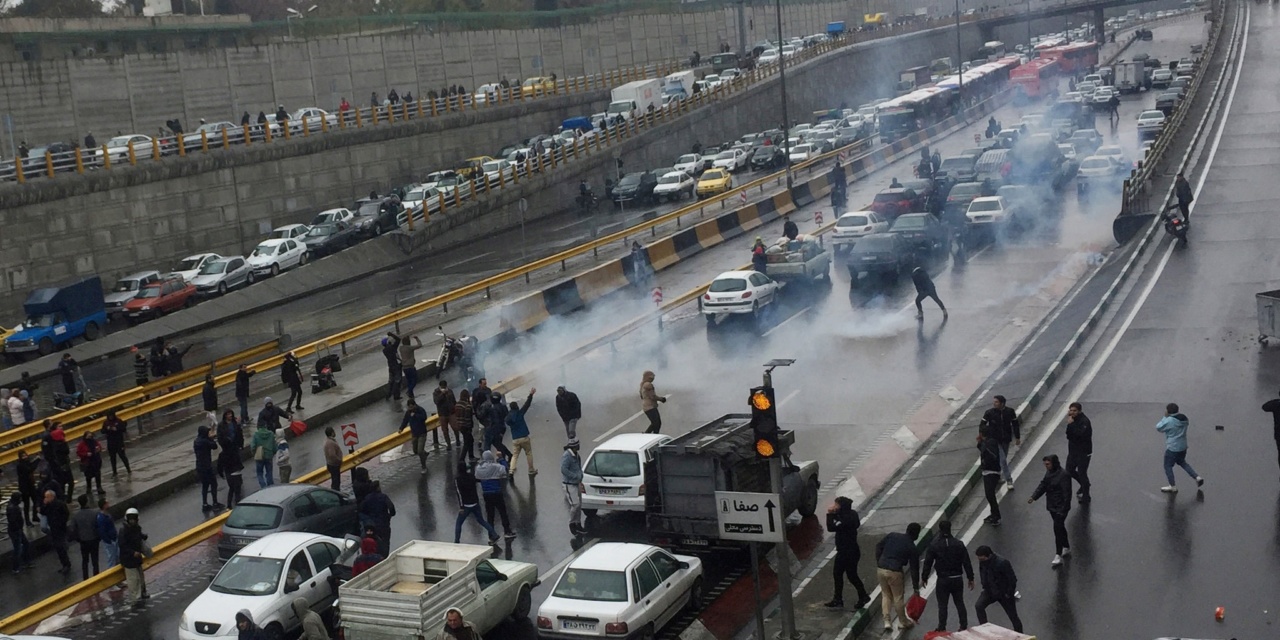A protest in Tehran against a sudden rise in petrol prices, November 16, 2019 (WANA/Reuters)
Amnesty International has raised its death toll in Iran’s recent mass protests to at least 208.
The protests erupted on November 15 after the Government’s midnight announcement of a rise in petrol prices between 50% and 200%. Over the next three days, security forces confronted the demonstrations as some protesters set fire to banks — targeted because of anger over corruption and the economic situation — and Government buildings.
The opposition Green Movement’s site Kalameh says at least 366 demonstrators were killed. The regime, which cut off 95% of the Internet to limit news, reportedly refused to return bodies to families, who have been warned not to speak to media.
Amnesty again warned on Monday that the number of victims is likely to be far higher. The organization has compiled its figure from interviews with witnesses and relatives of those killed and through examination of documented video of the demonstrations.
See also Iran Daily, Dec 2: Killing Protesters in Shiraz
Amnesty has said that many of the victims were killed at close range by security forces, and that some were shot in the back ass they ran way.
Philip Luther, Amnesty’s director for the Middle East and North America, said the “alarming” and “shocking toll” was “evidence that Iran’s security forces went on a horrific killing spree” amid “the Iranian authorities’ shameful disregard for human life”.
He called on the international community to ensure accountability for “those responsible for this bloody clampdown”.
The Islamic Republic’s mission to the UN in Geneva tried to dismiss the report by criticizing Amnesty’s “credibility…due to its past pattern of over-reliance on discredited and unreliable sources and because of certain in-built biases concerning Iran”.
The mission insisted, “Iran fully respects the right to peaceful assemblies” but claimed that “hundreds of law enforcement and police forces [and] innocent citizens were among the casualties” and that “the security authorities exercised maximum restraint and care”.
Tehran has not issued an official death toll, let alone evidence of “hundreds” of security personnel and bystanders killed. It has ignored the killing of protesters while highlighting the funerals of a Revolutionary Guards solder and a civilian whom it claimed were slain by demonstrators.
But a governor undercut the regime narrative, saying she ordered security forces to open fire on protesters who entered her official building.
Layla Vaseqi, who oversees Qal’eh Hassan Khan in Qods township, said:
A few guards were left, and when they saw a swarm of enraged people advancing towards the governor’s headquarters, they retreated. Therefore, angry protesters broke down the gate and invaded the compound….
“Shoot us if you can,” the protesters chanted; since they knew that the guards had no permission to open fire. As the governor, I immediately ordered the security guards to shoot anybody stepping inside the governor’s building.
She said that, after the protesters took over the compound, she went to a Guards base and returned with more forces.
She did not say how many people were shot on her orders.
Kalemeh said eight to ten protesters were killed and many more injured in Qal’eh Hassan Khan.
Regime Blames “Rioters” and Israel
In the regime’s latest attempt to justify the crackdown and more than 7,000 arrests, a Revolutionary Guards commander said detained “rioters” have “confessed to connections with Israel”.
Brig. Gen. Mohammad-Esmail Kowsari, the acting commander of a Guards headquarters in Tehran, said, “When the authorities say it, there is definitely evidence. These individuals accepted this charge when they were interrogated.”
But cracks are appearing within the establishment.
Reformist MP Mahmoud Sadeqi said in an interview on Monday that the security forces “preemptively” arrested a number of students who did not take part in protests.
Sadeqi, who has come under regime pressure over previous criticisms, said the illegal arrests should be investigated and explained by authorities.
Security forces reportedly arrested at least 50 Tehran University students at their homes.

